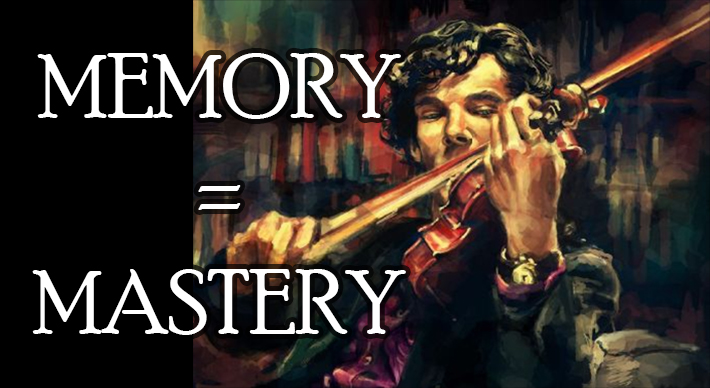Imagine if Tom Brady had to refer to an instructional DVD every time he had to throw a football.
Imagine if Warren Buffett had to refer to a business textbook every time he was pitched a business deal.
Imagine if Eminem had to pull out a notebook of his own lyrics every time he had to freestyle on camera.
Imagine if your mechanic had to refer to a YouTube video every time he had to change your oil.
Sounds ridiculous, doesn’t it? But why?
Because we equate memory with mastery.
Externally-stored memories such as notes in a notebook, or videos on the internet don’t count as part of your “true knowledge base”, the knowledge that you know by heart and can conjure even if you were stranded on an island or locked in a cell.
Experts and professionals should not need to refer to external memory tools to do the basic aspects of their jobs. Whether you’re an athlete or a surgeon, people will judge your proficiency (the “eye test”) by the degree of your muscle memory for your craft, regardless if that craft is physical or mental.
If you’re a dog trainer, you should be able to differentiate between different dog breeds without the need for a book.
If you’re an analyst, you should be able to pitch your best investment idea to an investor even if you were stranded in the wilderness without your computer or your papers.
If you’re a coach, you should have your team’s playbook memorized by heart and be able to summon and draw up the play when the situation calls for it.
And so on, and so forth.
Any less than this, and you fall short of being a master at your craft and being recognized as an expert.
Why Memory is Overlooked
Despite our natural inclination to judge the competency of others by their ability to recall information in the spur of the moment, the idea that memory equates to mastery is often overlooked.
In school, we memorize mostly impractical things and then forget all of it shortly after being tested. Because of this relationship many of us have with memory, we have a natural resistance towards the idea of memorizing things.
If you can ask Siri and get the answer in a few seconds, why bother memorizing anything?
When You Need to Remember, and When You Don’t
In this modern world of note apps, digital calendars, voice memos, and cameras, you can get away with not opting to memorize many things, such as grocery lists and most phone numbers.
But many other things must be committed to memory, such as your main goals and highest values. Even simple things like the answer to the question: “What is the best way to start my morning so that I have the highest chance of being productive today and going to bed tonight with minimal regrets?” should be remembered. If you cannot recall your goals or your optimal morning routine without having to consult a piece of paper or another external tool, it is less likely to be fulfilled. How can you achieve goals you can’t remember setting?
In whatever it is you wish to excel at, you must figure out what needs to be remembered without an external aid and what doesn’t. Once you have identified the things that must be remembered, practice and repetition is key. But just know that until you have committed those things to your memory, it has not really become a true part of you yet.
Automatic recall of the fundamentals of your craft at the precise moment it is needed is the foundation to higher level acts such as execution and creative application.
If you’re an analyst who can’t remember what deferred revenue is, or what NOI stands for, or even what the hotkeys on Excel are, then your execution will be slower than someone who does remember.
If you’re an investor who has no memory of historical financial crashes, your decision-making will be inferior to someone who does remember, during times of similar circumstances.
Memory = Mastery.
Moonwalking with Einstein
The book that inspired and empowered me to improve my memory skills was Moonwalking with Einstein. The author, Josh Foer, learned memory techniques from memory athletes he was covering as a journalist. He then went on to win a national memory competition in the U.S. using those techniques—an incredible feat.
Like Joshua, I never thought I had a good memory myself. But after learning about how memory works, and building my own memory palace (a technique I learned from the book, although you may be familiar of the concept from Sherlock Holmes), many friends began to comment on my memory over the years. They would say things like, “I can’t believe you remembered that!” or, “Wow, you have a good memory.”
My newfound faith in my memory also gave me confidence as an entrepreneur and investor. I realized that the main thing separating me from the people I admired in the investing world was memory—the foundation of mastery.

